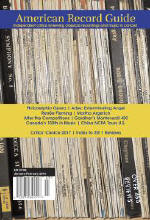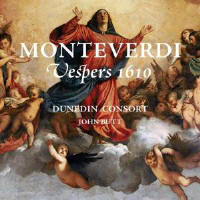Texte paru dans: / Appeared in: |
|
|
Outil de traduction ~ (Très approximatif) |
|
|
Reviewer: John
W. Barker
John Butt’s Dunedin Consort has racked up an impressive catalog of
recordings of major works, mostly by Bach but also by Mozart and Handel. It
was inevitable that he and his group should tackle that earliest of Baroque
masterpieces, the Monteverdi Vespers. Butt himself has written extensive
booklet notes to explain not only specific performance decisions but also to
argue for his approach. He has perceived a considerable stylistic
consistency and unity through the full compositional assemblage. Though he
resists the idea that he is arguing for a “concert work” identity for it,
that is essentially what he is doing. He rigorously argues against
identifying it with liturgical functions and strictly avoids what many other
directors have done in the way of interpolating plainchant antiphons to make
it sound like part of a liturgical celebration. It is a case worth making,
and Butt carries it out scrupulously. He employs 10 singers, who share solo
assignments and become the “chorus” as needed. His instrumental resources
are 20 players: 6 on strings, with theorbo (Elizabeth Kenny, no less); on
flute, recorders (2), harp, harpsichord, and organ, plus 3 cornets and 3
sackbuts of the “brass” group. All performers are excellent and work
intensively together. Butt’s tempos are propulsive, and the recording is
close up, especially for the singers. Yet, the expected clarity of parts is
not always achieved. It is not always possible to follow the lines in
ensembles. Notably lost is the function of the plainchant embedding in the
Psalm settings. To follow that is crucial to appreciating how Monteverdi is
modifying his use of prima prattica style in his writing. It might have been
a good idea to have an instrument double that part all the time. I must add
that Butt’s doctrines do not allow him to include the alternate six-part
Magnificat, for which there is ample space. There is much here that I can
respect, but a lot that I cannot love. It is difficult to put my finger on
exactly why, but I do not find this performance a moving one. I am glad to
listen to it once, but I would not recommend it for repeated hearing of this
work. The ample booklet includes texts and translations, with identification
of specific performers. | |
|
Support us financially by purchasing this disc from eiher one of these
suppliers. Un achat via l'un ou l'autre des fournisseurs proposés contribue à défrayer les coûts d'exploitation |
|
|
|
|
|
Cliquez l'un ou l'autre
bouton pour découvrir bien d'autres critiques de CD |
|




